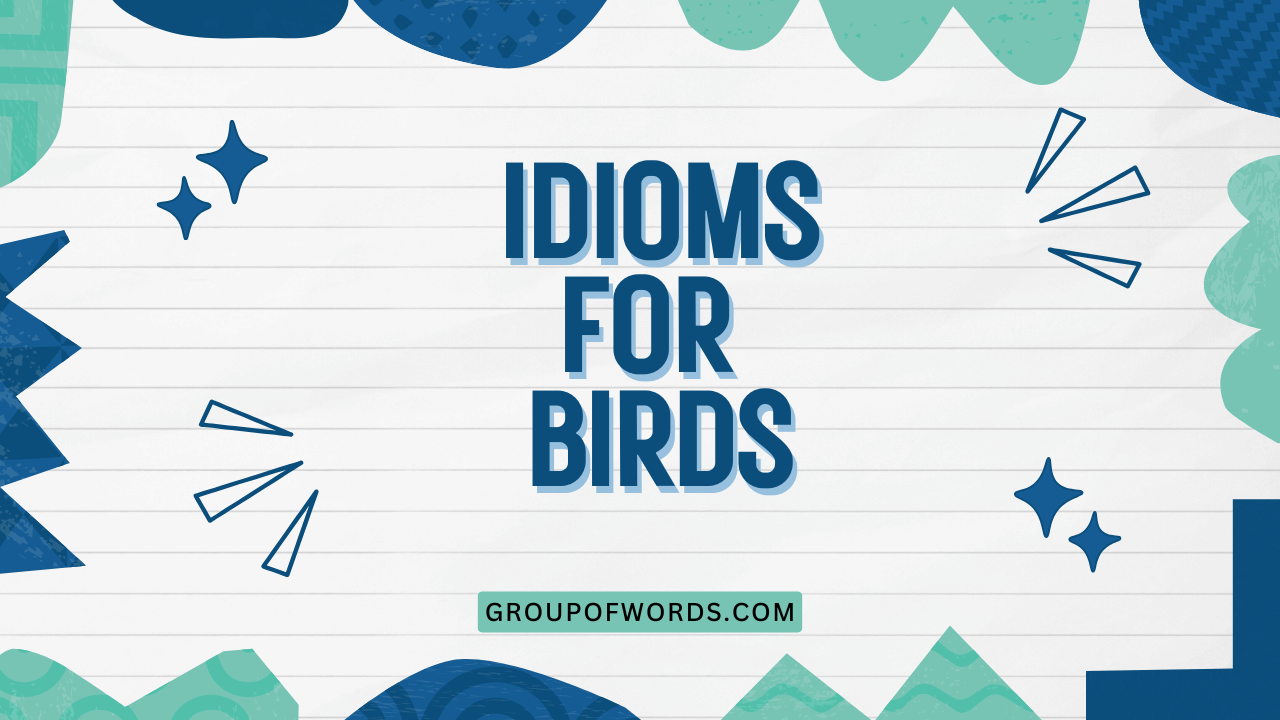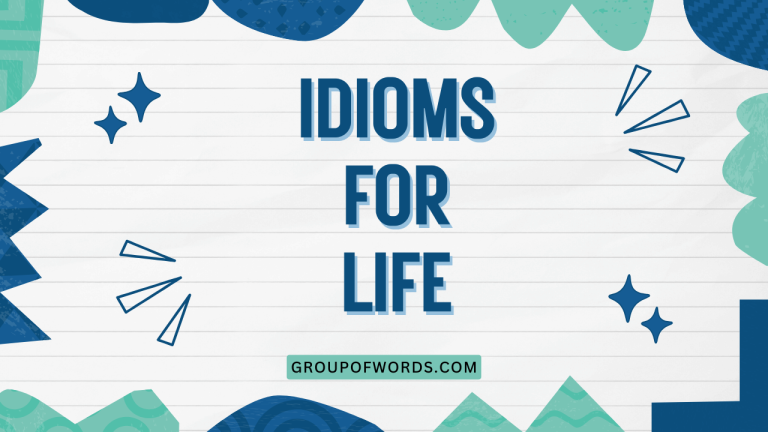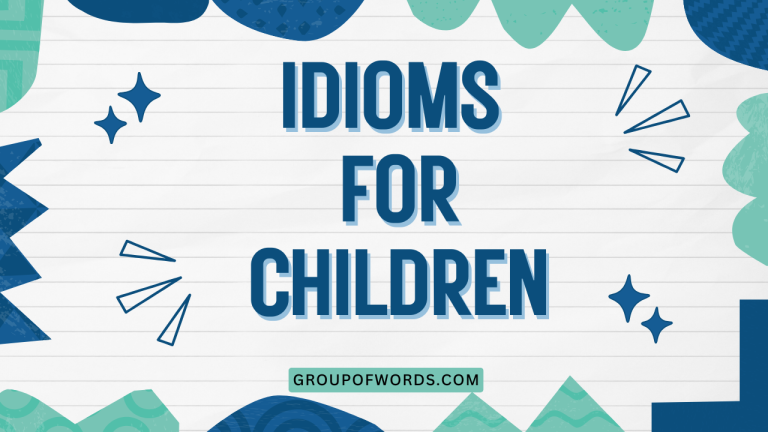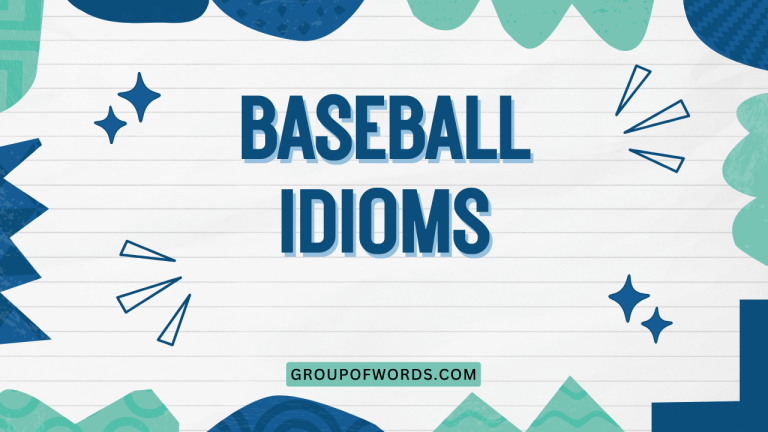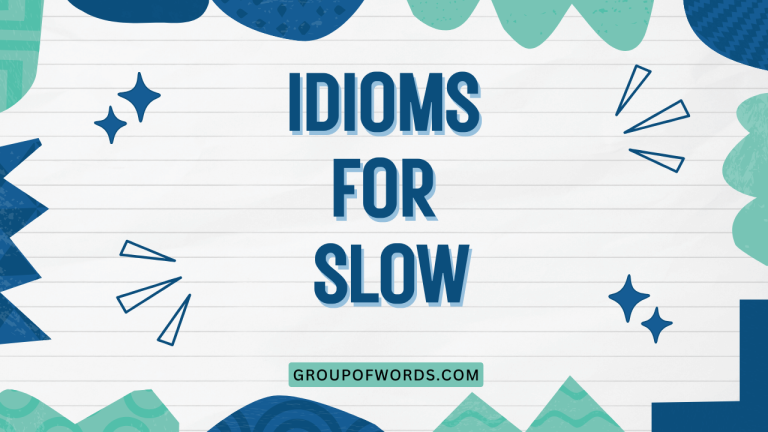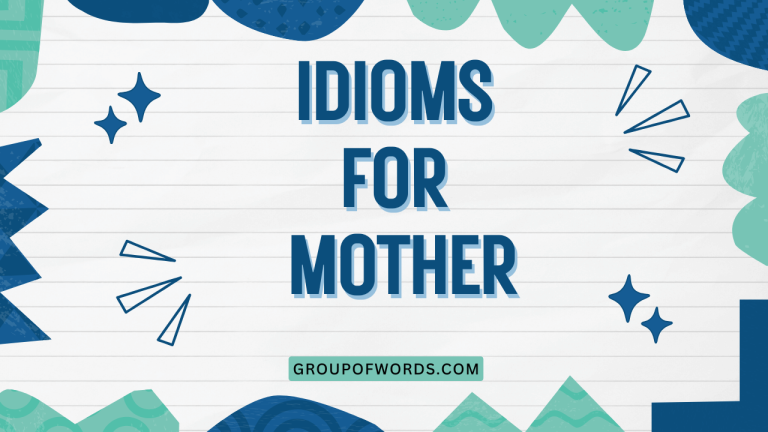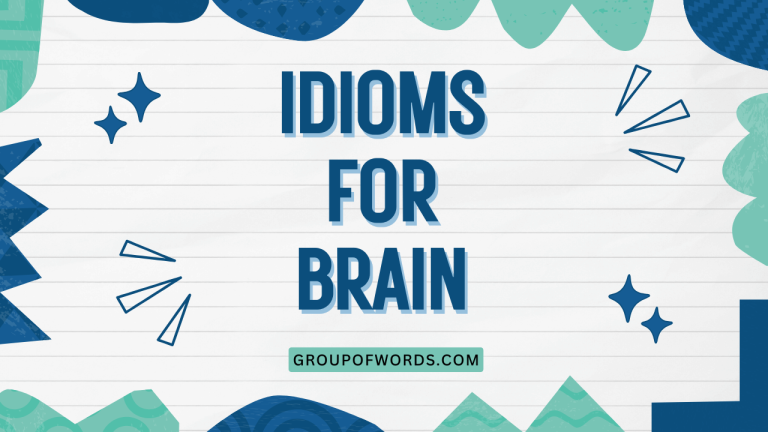Idioms for Birds: A Comprehensive Guide to Avian Expressions
Idioms are colorful expressions that add depth and nuance to the English language. Bird-related idioms are particularly vibrant, drawing on the characteristics and behaviors of birds to convey a wide range of meanings.
Understanding these idioms is crucial for comprehending spoken and written English, enhancing communication skills, and appreciating the cultural richness of the language. This article provides a comprehensive guide to bird idioms, exploring their definitions, origins, usage, and common pitfalls.
Whether you’re an English language learner, a seasoned speaker, or simply curious about the origins of these expressions, this guide will help you master the fascinating world of bird idioms.
Table of Contents
- Introduction
- Definition of Idioms and Bird Idioms
- Structural Breakdown of Bird Idioms
- Types and Categories of Bird Idioms
- Examples of Bird Idioms
- Usage Rules for Bird Idioms
- Common Mistakes with Bird Idioms
- Practice Exercises
- Advanced Topics in Bird Idioms
- Frequently Asked Questions
- Conclusion
Definition of Idioms and Bird Idioms
An idiom is a phrase or expression whose meaning cannot be understood from the literal meanings of the individual words. Instead, the phrase has a figurative meaning that is culturally specific. Idioms add color, expressiveness, and depth to language, making communication more engaging and nuanced. They often reflect the history, culture, and values of a particular language community.
Bird idioms are a subset of idioms that use birds or their characteristics as metaphors to convey specific meanings. These idioms often draw on the perceived qualities of birds, such as their freedom, beauty, fragility, or tendency to flock together. Bird idioms are used to describe people, situations, and emotions in a figurative and often humorous way. The effectiveness of bird idioms relies on the listener’s understanding of both the literal meaning of the words and the cultural context in which the idiom is used.
Structural Breakdown of Bird Idioms
Bird idioms, like all idioms, are structurally fixed expressions. This means that the words in the idiom cannot be changed or rearranged without altering or destroying its meaning.
The structure of bird idioms can vary, but they often follow common patterns such as:
- Verb + Bird Noun: Eat like a bird
- Adjective + Bird Noun: Free as a bird
- Prepositional Phrase with Bird Noun: For the birds
- Simile with Bird Noun: As graceful as a swan
Understanding these structural patterns can help learners recognize and interpret bird idioms more effectively. However, it’s important to remember that the meaning of the idiom is not derived from the individual words but from the phrase as a whole.
Types and Categories of Bird Idioms
Bird idioms can be categorized based on their connotation (positive, negative, or neutral) or by the specific bird referenced. Here are some broad categories:
Idioms with Positive Connotations
These idioms typically evoke feelings of freedom, beauty, or grace. They often describe positive qualities or experiences.
Idioms with Negative Connotations
These idioms often convey feelings of foolishness, insignificance, or misfortune. They are used to describe undesirable situations or qualities.
Idioms with Neutral Connotations
These idioms are neither inherently positive nor negative. Their meaning depends on the context in which they are used.
They often describe actions or situations without implying judgment.
Examples of Bird Idioms
The following sections provide extensive examples of bird idioms, categorized by their connotation. Each example includes the idiom, its meaning, and example sentences to illustrate its usage.
Bird Idioms with Positive Connotations
This section provides examples of bird idioms that carry positive connotations, such as freedom, beauty, and happiness. These idioms are often used to describe desirable situations or qualities.
Here is a table with 30 examples of bird idioms with positive connotations:
| Idiom | Meaning | Example Sentence |
|---|---|---|
| Free as a bird | Completely free and unconstrained. | Now that she’s retired, she feels as free as a bird and can travel wherever she wants. |
| As graceful as a swan | Elegant and poised in movement. | The ballerina was as graceful as a swan, effortlessly gliding across the stage. |
| Happy as a lark | Extremely happy and cheerful. | He was happy as a lark on his birthday, surrounded by friends and family. |
| Spread one’s wings | To become independent and explore new opportunities. | After graduating, she decided to spread her wings and travel the world. |
| Eagle-eyed | Having sharp vision or attention to detail. | The editor was eagle-eyed and caught several errors in the manuscript. |
| To feather one’s nest | To enrich oneself, often dishonestly. | He used his position to feather his nest, accumulating wealth through corrupt practices. |
| A bird in the hand is worth two in the bush | It’s better to hold onto something you have than to risk losing it by trying to get something better. | I was tempted to quit my job for a higher-paying one, but then I thought a bird in the hand is worth two in the bush, so I stayed. |
| Wise as an owl | Very intelligent and knowledgeable. | My grandfather is wise as an owl; he always gives the best advice. |
| Soar like an eagle | To rise to a high level of success or achievement. | With hard work and dedication, she will soar like an eagle in her career. |
| Build a nest egg | To save money for the future. | They are diligently working to build a nest egg for their retirement. |
| Fly the nest | To leave one’s parents’ home to live independently. | Both of their children have flown the nest and are living in different cities. |
| Like water off a duck’s back | Having no effect on someone. | Criticism rolls off him like water off a duck’s back; he doesn’t let it bother him. |
| As gentle as a dove | Very kind and peaceful. | She is as gentle as a dove and always tries to avoid conflict. |
| Early bird catches the worm | The person who arrives first has the best chance of success. | I got to the sale early because the early bird catches the worm. |
| Have a bird’s-eye view | To have a perspective from above, offering a comprehensive view. | From the top of the mountain, we had a bird’s-eye view of the entire valley. |
| Sing like a lark | To sing beautifully and joyfully. | She sings like a lark and always brightens up the room with her voice. |
| Proud as a peacock | Very proud and vain. | He was proud as a peacock after winning the award. |
| Swift as a swallow | Very fast and agile. | The messenger was swift as a swallow, delivering the news in record time. |
| To take under one’s wing | To mentor or protect someone. | The experienced manager decided to take the new employee under her wing. |
| A rare bird | An unusual or exceptional person. | He is a rare bird in the industry, always willing to help others. |
| Fly high | To achieve great success. | With her talent and determination, she is sure to fly high in her career. |
| Land like a duck | To land smoothly and gracefully. | The pilot managed to land like a duck, despite the strong winds. |
| Sly as a fox, brave as a lion | A combination of cunning and courage. | He approached the negotiation sly as a fox, brave as a lion securing the best deal for his company. |
| A homing pigeon | Someone who always returns to their home or roots. | Despite living abroad for years, he’s a real homing pigeon, always coming back to visit his family. |
| To have wings on one’s heels | To move very quickly. | She seemed to have wings on her heels as she rushed to catch the train. |
| Light as a feather | Very light in weight; often associated with freedom and ease. | The dancer was as light as a feather when she performed her solo. |
| Like a canary in a coal mine | An early warning sign of danger. | The declining sales figures were like a canary in a coal mine, signaling trouble for the company. |
| As loyal as a swan | Extremely faithful and devoted. | She is as loyal as a swan to her friends and family. |
| With open arms | Welcoming and receptive. | They received the new student with open arms, making her feel right at home. |
| To come out of one’s shell | To become more outgoing and confident. | After joining the drama club, she started to come out of her shell. |
Bird Idioms with Negative Connotations
This section explores bird idioms that carry negative connotations, such as foolishness, insignificance, and misfortune. These idioms are often used to describe undesirable situations or qualities.
Here is a table with 30 examples of bird idioms with negative connotations:
| Idiom | Meaning | Example Sentence |
|---|---|---|
| For the birds | Worthless, uninteresting, or nonsensical. | That movie was strictly for the birds; I couldn’t understand the plot at all. |
| A birdbrain | A stupid or unintelligent person. | He’s such a birdbrain; he can’t even remember the simplest things. |
| Eat like a bird | To eat very little. | She eats like a bird and is always worried about gaining weight. |
| Crazy as a loon | Completely insane or eccentric. | He’s crazy as a loon and often talks to himself in public. |
| Kill the goose that lays the golden eggs | To destroy something that is a source of profit or success. | By overworking their employees, they are killing the goose that lays the golden eggs. |
| As dead as a dodo | Completely extinct or obsolete. | That technology is as dead as a dodo; nobody uses it anymore. |
| A sitting duck | An easy target. | Without security measures, the company’s data is a sitting duck for hackers. |
| Go to the birds | To deteriorate or decline. | Since the factory closed, the town has gone to the birds. |
| Like a lame duck | Ineffective or unsuccessful. | The project was like a lame duck from the start, doomed to fail. |
| A wild goose chase | A pointless or fruitless search. | We went on a wild goose chase trying to find that rare book. |
| Ruffle someone’s feathers | To annoy or irritate someone. | His comments ruffled her feathers, and she stormed out of the room. |
| Chicken out | To back out of something due to fear. | He was going to bungee jump, but he chickened out at the last minute. |
| As scarce as hen’s teeth | Extremely rare or nonexistent. | Good mechanics are as scarce as hen’s teeth in this town. |
| Ugly duckling | Someone who is unattractive at first but later becomes beautiful or successful. | She was an ugly duckling in high school, but now she’s a successful model. |
| Birds of ill omen | Harbingers of bad news or misfortune. | The rumors of layoffs were like birds of ill omen, creating anxiety among the employees. |
| To be pigeonholed | To be unfairly categorized or stereotyped. | She felt pigeonholed as a children’s book author, even though she wanted to write novels. |
| To have a feather in one’s cap | To have achieved something noteworthy (often used sarcastically). | He thinks he has a feather in his cap for finishing the project, but it was full of errors. |
| To be henpecked | To be constantly nagged or dominated by one’s wife. | He’s so henpecked that he can’t make a decision without his wife’s approval. |
| To count one’s chickens before they hatch | To make plans based on assumptions that may not come true. | They were counting their chickens before they hatched by spending the money before they received it. |
| Drop like flies | To fall ill or die in large numbers. | During the epidemic, people were dropping like flies. |
| As mad as a March hare | Completely insane or irrational (though hare, not bird). | He’s been acting as mad as a March hare ever since he lost his job. |
| To make a beeline | To go directly and quickly towards something (though bee, not bird). | She made a beeline for the dessert table as soon as she arrived at the party. |
| Flew the coop | Escaped or left suddenly. | The suspect flew the coop before the police arrived. |
| Bird of passage | Someone who doesn’t stay in one place for long. | He’s a bird of passage; he never stays in one city for more than a few months. |
| A cuckoo in the nest | An unwelcome intruder or someone who disrupts a group. | He felt like a cuckoo in the nest when he joined the established team. |
| To parrot someone | To repeat what someone else has said without understanding it. | He just parrots everything his boss says without thinking for himself. |
| Cry wolf | To raise a false alarm. | If you cry wolf too often, people won’t believe you when there’s a real emergency. |
| The tail wagging the dog | A situation where a minor part controls the whole. | It felt like the tail wagging the dog when the intern started making decisions for the senior managers. |
| A feather in the wind | Easily influenced or lacking direction. | Without a clear goal, he felt like a feather in the wind, drifting aimlessly. |
| To have bats in the belfry | To be eccentric or slightly mad (though bat, not bird). | She’s a bit odd; some people say she has bats in the belfry. |
Bird Idioms with Neutral Connotations
This section features bird idioms that carry a neutral connotation. These idioms are neither inherently positive nor negative, and their meaning depends on the context in which they are used.
They often describe actions or situations without implying judgment.
Here is a table with 20 examples of bird idioms with neutral connotations:
| Idiom | Meaning | Example Sentence |
|---|---|---|
| Birds of a feather flock together | People who are similar tend to associate with each other. | Birds of a feather flock together; the athletes always hang out with each other. |
| Kill two birds with one stone | To accomplish two things at once. | By exercising while listening to a podcast, I kill two birds with one stone. |
| A little bird told me | I heard something from a secret source. | A little bird told me that you’re getting a promotion. |
| As the crow flies | In a straight line, the shortest distance. | As the crow flies, it’s only a few miles to the next town, but the road is much longer. |
| Nest | A place where someone or something flourishes. | Silicon Valley is a nest for tech startups. |
| To make one’s nest | To settle down and make a home. | After years of traveling, they decided to make their nest in a small town. |
| Swan song | A final performance or farewell appearance. | The concert was the band’s swan song before they retired. |
| To wing it | To improvise or do something without preparation. | I didn’t have time to prepare, so I had to wing it during the presentation. |
| To clip someone’s wings | To limit someone’s freedom or potential. | The strict rules clipped her wings and prevented her from pursuing her dreams. |
| Watch like a hawk | To observe closely and carefully. | The security guard watched the store like a hawk to prevent theft. |
| A duck to water | To adapt to something new very easily. | He took a duck to water when he learned to code. |
| Nest egg | An accumulation of money saved for the future | She had a sizable nest egg saved up for retirement. |
| Come home to roost | For negative consequences to become apparent. | His past mistakes came home to roost when he was denied the promotion. |
| Happy-go-lucky | Carefree and untroubled. | He has a happy-go-lucky attitude towards life. |
| To brood | To think deeply about something that makes one unhappy. | She tended to brood over minor problems. |
| Laying an egg | To fail badly or perform poorly (often in entertainment). | The comedian laid an egg with his performance last night. |
| As regular as clockwork | Occurring at very regular intervals. | The train arrives as regular as clockwork every morning at 7:00 AM. |
| Eagle eye | Sharp vision. | The referee had an eagle eye and caught every foul. |
| To be on the wing | Flying or traveling. | The migratory birds are on the wing heading south for the winter. |
| To learn a song (or sing a different tune) | To change one’s opinion or behavior. | After hearing the evidence, he learned a new song and admitted he was wrong. |
Usage Rules for Bird Idioms
Using bird idioms correctly requires understanding their specific meanings and contexts. Here are some general usage rules:
- Context is Key: The meaning of a bird idiom can vary depending on the context in which it is used. Pay attention to the surrounding words and phrases to determine the intended meaning.
- Audience Awareness: Be mindful of your audience when using bird idioms. Some idioms may be unfamiliar to non-native speakers or people from different cultural backgrounds.
- Figurative Language: Remember that bird idioms are figurative expressions, not literal descriptions. Avoid interpreting them in a literal sense.
- Grammatical Structure: Bird idioms have a fixed grammatical structure. Do not change the word order or substitute words, as this can alter or destroy the meaning.
While many idioms are relatively stable, some can be adapted slightly for emphasis or to fit the grammatical structure of a sentence. For example:
- Original: “Free as a bird.”
- Adapted: “She felt as free as a bird after finishing her exams.”
However, avoid making significant changes to the idiom, as this can make it difficult to understand.
Common Mistakes with Bird Idioms
Learners often make mistakes when using bird idioms due to misinterpreting their meanings or misapplying them in inappropriate contexts. Here are some common mistakes and how to avoid them:
| Mistake | Correct Usage | Explanation |
|---|---|---|
| Literal Interpretation: “He eats like a bird, so he must eat a lot.” | Figurative Interpretation: “He eats like a bird, so he eats very little.” | “Eat like a bird” means to eat a small amount, not a large amount. |
| Misunderstanding Connotation: “She’s as crazy as a loon, which means she’s very creative.” | Correct Connotation: “She’s as crazy as a loon, which means she’s completely insane.” | “Crazy as a loon” has a negative connotation and means insane, not creative. |
| Incorrect Word Order: “A bird in the bush is worth two in the hand.” | Correct Word Order: “A bird in the hand is worth two in the bush.” | The correct order is “a bird in the hand is worth two in the bush.” Reversing the order changes the meaning. |
| Inappropriate Context: “The funeral was for the birds.” | More Appropriate: “The presentation was for the birds.” | “For the birds” means worthless or uninteresting. It’s inappropriate to use it in the context of a funeral. |
| Mixing Up Idioms: “He’s counting his eggs before they hatch.” | Correct Idiom: “He’s counting his chickens before they hatch.” | The correct idiom is “counting your chickens,” not “eggs.” |
Practice Exercises
Test your understanding of bird idioms with the following practice exercises. Choose the correct meaning of the idiom in each sentence.
Exercise 1: Multiple Choice
Choose the correct meaning of the idiom in each sentence below.
| Question | Options | Answer |
|---|---|---|
| 1. He decided to spread his wings and travel the world. | a) To become independent and explore new opportunities. b) To become tired and rest. c) To become angry and aggressive. | a) To become independent and explore new opportunities. |
| 2. The editor was eagle-eyed and caught several errors. | a) Having poor vision. b) Having sharp vision or attention to detail. c) Being easily distracted. | b) Having sharp vision or attention to detail. |
| 3. That movie was strictly for the birds. | a) Very entertaining. b) Worthless or uninteresting. c) Educational. | b) Worthless or uninteresting. |
| 4. She eats like a bird and is always worried about gaining weight. | a) Eats a lot. b) Eats very little. c) Eats only seeds. | b) Eats very little. |
| 5. They killed the goose that lays the golden eggs by overworking their employees. | a) Improved their business. b) Destroyed a source of profit. c) Helped their employees. | b) Destroyed a source of profit. |
| 6. The suspect flew the coop before the police arrived. | a) Surrendered to the police. b) Escaped. c) Cooperated with the investigation. | b) Escaped. |
| 7. The athlete took a duck to water when he learned to swim. | a) Struggled immensely. b) Adapted very easily. c) Refused to participate. | b) Adapted very easily. |
| 8. He’s counting his chickens before they hatch by spending the money already. | a) Being very cautious. b) Making plans based on assumptions. c) Saving money wisely. | b) Making plans based on assumptions. |
| 9. His past mistakes came home to roost when he was denied the promotion. | a) Were forgiven and forgotten. b) Became apparent with negative consequences. c) Led to unexpected success. | b) Became apparent with negative consequences. |
| 10. She felt pigeonholed as a children’s book author. | a) Celebrated for her achievements. b) Unfairly categorized or stereotyped. c) Recognized for her versatility. | b) Unfairly categorized or stereotyped. |
Exercise 2: Fill in the Blanks
Complete each sentence with the correct bird idiom from the list below.
Idiom List: a wild goose chase, birds of a feather flock together, crazy as a loon, as the crow flies, a little bird told me, killing two birds with one stone, chicken out, wise as an owl, watch like a hawk, ruffle someone’s feathers
| Question | Answer |
|---|---|
| 1. We went on ___________ trying to find that rare book. | a wild goose chase |
| 2. ___________; the athletes always hang out with each other. | Birds of a feather flock together |
| 3. He’s ___________ and often talks to himself in public. | crazy as a loon |
| 4. ___________, it’s only a few miles to the next town. | As the crow flies |
| 5. ___________ that you’re getting a promotion. | A little bird told me |
| 6. By exercising while listening to a podcast, I am ___________ . | killing two birds with one stone |
| 7. He was going to bungee jump, but he ___________ at the last minute. | chickened out |
| 8. My grandfather is ___________; he always gives the best advice. | wise as an owl |
| 9. The security guard will ___________ to prevent theft. | watch like a hawk |
| 10. His comments are sure to ___________, and she’ll storm out of the room. | ruffle someone’s feathers |
Advanced Topics in Bird Idioms
For advanced learners, exploring the origins and cultural significance of bird idioms can provide a deeper understanding of their usage. Researching the historical context in which these idioms arose can reveal fascinating insights into the values and beliefs of different cultures.
For example, the idiom “early bird catches the worm” reflects the importance of diligence and initiative in Western cultures. Similarly, understanding the specific characteristics associated with different birds in various cultures can shed light on the nuances of bird idioms.
For instance, the owl is often associated with wisdom in Western cultures, while in some other cultures, it is seen as a symbol of bad luck.
Studying the evolution of bird idioms over time can also be a rewarding exercise. Some idioms have remained relatively unchanged, while others have undergone subtle shifts in meaning or usage.
Analyzing these changes can provide valuable insights into the dynamic nature of language and culture. Furthermore, comparing bird idioms across different languages can reveal both similarities and differences in how birds are used as metaphors.
This comparative analysis can enhance cross-cultural communication skills and broaden one’s understanding of linguistic diversity.
Frequently Asked Questions
Here are some frequently asked questions about bird idioms:
- What is the difference between an idiom and a proverb?
An idiom is a phrase whose meaning is different from the literal meanings of its individual words (e.g., “kick the bucket”). A proverb is a short, well-known saying that expresses a general truth or piece of advice (e.g., “look before you leap”). Idioms are more about figurative language, while proverbs are more about imparting wisdom.
- Why are bird idioms so common in English?
Birds have long been a source of fascination and inspiration for humans. Their unique characteristics, such as their ability to fly, their diverse behaviors, and their beautiful songs, make them ideal metaphors for describing various aspects of human life. Additionally, birds are widespread and easily observable, making them familiar to people from different backgrounds.
- Can bird idioms be used in formal writing?
While bird idioms can add color and expressiveness to writing, they are generally more appropriate for informal contexts. In formal writing, it’s best to use more direct and literal language to avoid ambiguity and maintain a professional tone. However, some well-known and widely accepted bird idioms may be used sparingly in certain formal contexts.
- How can I learn more bird idioms?
The best way to learn more bird idioms is to read widely, listen to native speakers, and pay attention to how idioms are used in context. You can also consult idiom dictionaries and online resources that provide definitions and examples of bird idioms. Practice using bird idioms in your own writing and speaking to reinforce your understanding.
- Are bird idioms the same in all English-speaking countries?
While many bird idioms are
the same across English-speaking countries, some may vary in usage or popularity. Regional variations in language and culture can influence the prevalence and interpretation of certain idioms. It’s essential to be aware of these regional differences and to adapt your usage accordingly.
Conclusion
Bird idioms offer a rich and colorful way to express ideas and emotions in the English language. By understanding their meanings, origins, and usage rules, you can enhance your communication skills and appreciate the cultural nuances of these avian expressions.
Whether you’re describing someone as “free as a bird” or warning against “counting your chickens before they hatch,” bird idioms provide a unique and memorable way to convey your message. Continue to explore and practice using these idioms to master the art of figurative language and to communicate more effectively in both spoken and written English.
Embrace the world of bird idioms, and let your language take flight!
